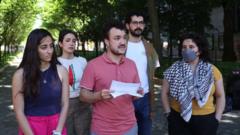The Trump administration's use of the Alien Enemies Act to deport 238 Venezuelan migrants has drawn scrutiny after investigations reveal a lack of evidence linking most individuals to criminal activity. The case highlights ongoing tensions around immigration policy and national security.
Controversial Deportations: Examining Trump’s Alien Enemies Act Utilization

Controversial Deportations: Examining Trump’s Alien Enemies Act Utilization
An analysis of the Trump administration's deportation strategy under the Alien Enemies Act, focusing on the case of 238 Venezuelan migrants labeled as gang members.
In a recent investigation, the application of the Alien Enemies Act by the Trump administration to deport 238 Venezuelan migrants has sparked significant controversy. The government categorized these individuals as members of the Tren de Aragua gang, purportedly linked to the Venezuelan government's alleged invasion of the United States. However, inquiries by The New York Times have uncovered little evidence supporting these claims.
One poignant story is that of Arturo Suárez Trejo, a musician who naively reached out to his wife, Nathali Sánchez, days before being sent to a maximum-security prison in El Salvador after being detained for a month in Texas. Suárez sent a hopeful message, assuring his family of his safety just prior to being swept into a chain of events that would result in his swift deportation.
The government's invocation of the Alien Enemies Act—an often controversial measure aimed at responding to perceived threats during wartime—has been criticized as a mechanism for hastening deportations without adequate due process. Critics argue this move is an overreach, manipulating legislation intended for extreme circumstances and disproportionately affecting vulnerable immigrant populations.
This situation not only affects the individuals directly involved but also resonates through their families and communities. Many relatives are left in limbo, grappling with uncertainty, anger, and separation. It raises broader questions about immigration policy, national security, and the ethical implications of rapid deportation strategies amidst an ongoing humanitarian crisis in Venezuela.
As these stories unfold, they emphasize the need for a thorough examination of policies affecting migrants, urging a more balanced approach that considers both national security concerns and the fundamental human rights of individuals caught within an increasingly complicated immigration system.
One poignant story is that of Arturo Suárez Trejo, a musician who naively reached out to his wife, Nathali Sánchez, days before being sent to a maximum-security prison in El Salvador after being detained for a month in Texas. Suárez sent a hopeful message, assuring his family of his safety just prior to being swept into a chain of events that would result in his swift deportation.
The government's invocation of the Alien Enemies Act—an often controversial measure aimed at responding to perceived threats during wartime—has been criticized as a mechanism for hastening deportations without adequate due process. Critics argue this move is an overreach, manipulating legislation intended for extreme circumstances and disproportionately affecting vulnerable immigrant populations.
This situation not only affects the individuals directly involved but also resonates through their families and communities. Many relatives are left in limbo, grappling with uncertainty, anger, and separation. It raises broader questions about immigration policy, national security, and the ethical implications of rapid deportation strategies amidst an ongoing humanitarian crisis in Venezuela.
As these stories unfold, they emphasize the need for a thorough examination of policies affecting migrants, urging a more balanced approach that considers both national security concerns and the fundamental human rights of individuals caught within an increasingly complicated immigration system.






















